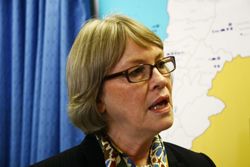 BEIRUT, 2007 (IRIN) – Rebuilding Nahr al-Bared, the northern Palestinian refugee camp devastated by a three-month conflict between the army and Islamist militants, will be one of the largest humanitarian projects ever undertaken by UNRWA, the UN
BEIRUT, 2007 (IRIN) – Rebuilding Nahr al-Bared, the northern Palestinian refugee camp devastated by a three-month conflict between the army and Islamist militants, will be one of the largest humanitarian projects ever undertaken by UNRWA, the UN
The battle between the army and Islamic militant group Fatah al-Islam not only destroyed buildings in Nahr al-Bared, but also ruined infrastructure and forced the camp’s 40,000 residents to flee, many of them sheltering in the already overcrowded Beddawi camp, 10km south.
At least 169 soldiers, 287 insurgents and 47 civilians were killed in the battle, which broke out on 20 May when the police raided a suspected hide-out linked to the group. In response, Fatah al-Islam fighters overran an army checkpoint outside their base in Nahr al-Bared, killing 33 soldiers.
The UN’s special coordinator for Lebanon, Geir Pedersen, stressed that the UN was committed to assisting the six Lebanese communities surrounding Nahr al-Bared which had also been affected by the conflict.
Nearly 1,000 families have returned to the “new camp” since the army opened up a section on 10 October, while UNRWA has built two schools in Beddawi for displaced school children, due to open next week. At the southern entrance of Nahr al-Bared, 96 displaced families have so far been accommodated in temporary houses.
|
Army to control all camps? Under the 1969 Cairo Agreement, security in Lebanon’s 12 official refugee camps, home to just over half the country’s 400,000 Palestinians, has been left to the Palestinian factions, with the army forbidden from crossing official camp boundaries. In its fight with Fatah al-Islam, the army ended up controlling the new and old camps. However, AbuZayd told IRIN the autonomous Palestinian security system was no longer viable. “This will be the precedent that, as is the case everywhere else in the world, the responsibility for [refugees’] security lies with the host authority. This works better than having closed-off camps and self-policing which leads to problems, particularly with the Palestinians as factionalised as they are.” UNRWA had spoken to the army about its plans for securing both the new and old camps after their reconstruction and welcomed any plan to extend the military’s control over all 11 other camps, said AbuZayd. UNRWA had received US$26 million from a budget request to donors of $50 million for the rehabilitation programme and had spent up to $8 million so far. hm/ar/mw |
|



